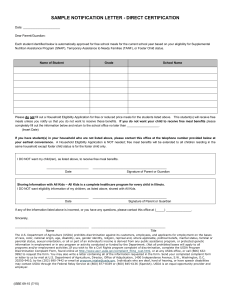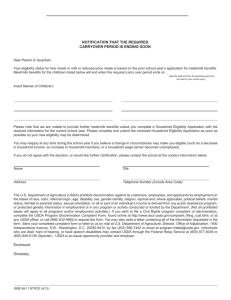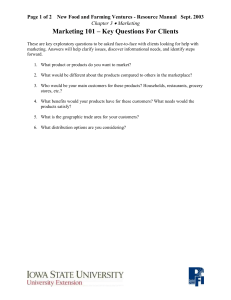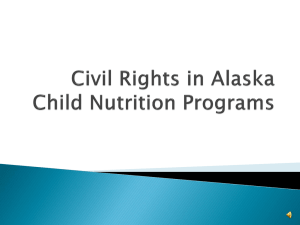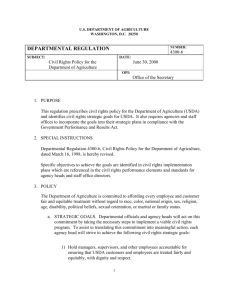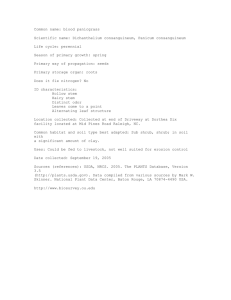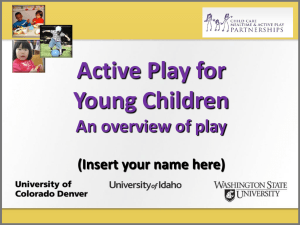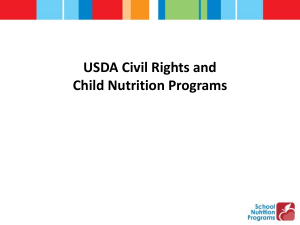2016 CACFP Civil Rights PPT - Delaware Department of Education
advertisement
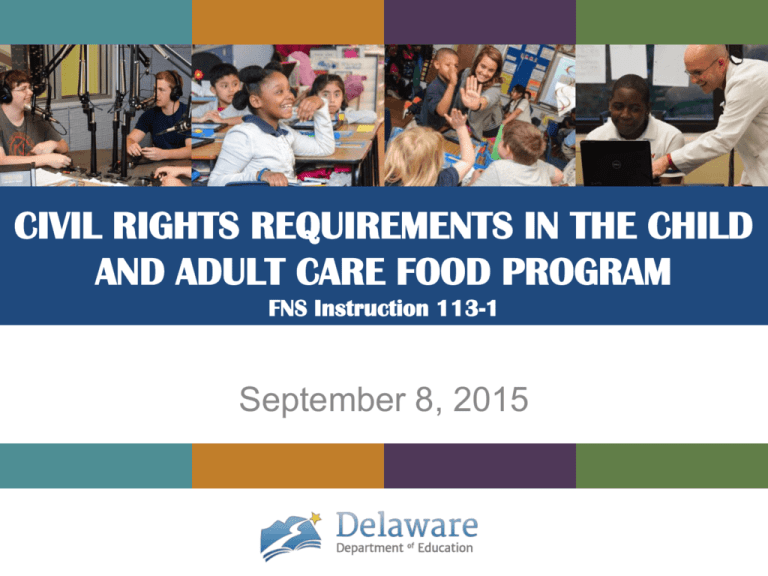
CIVIL RIGHTS REQUIREMENTS IN THE CHILD AND ADULT CARE FOOD PROGRAM FNS Instruction 113-1 September 8, 2015 Goals of Civil Rights in Child Nutrition Programs 1. Treat all applicants and beneficiaries equally. 2. Have knowledge of rights and responsibilities. 3. Eliminate unlawful barriers that prevent participants from receiving meal benefits. 4. Ensure dignity and respect for all. 2 TYPES OF DISCRIMINATION INTENTIONAL • Engaging in intentional discrimination based on race, color, or national origin. – Example: Giving one group or type larger portions or extra helpings of food. UNINTENTIONAL • A practice that results in discrimination but is unintentional. – Example: Not making IEF available in other languages. Note: IEFs in other languages are available on the USDA website CACFP Income Eligibility Form Other Languages 3 USDA COMPLIANCE • Detailed in FNS 113-1, Section XI, Civil Rights Training • Must be scheduled annually. Training must include: 1. Collection, review, and use of data 2. Public notification 3. Complaint procedures 4. Compliance review techniques 5. Resolution of non-compliance 6. Accommodating persons with disabilities 7. Language assistance 8. Conflict resolution 9. Customer service 4 1. Data Collection, Use & Review Collection • Income Eligibility Forms Use • To be used by administrative staff and other officials only in compliance with 7 CFR 245.6(f) Disclosure of children’s free and reduced price meal or free milk eligibility information to education and certain other programs and individuals without parent consent is NOT permitted. Review • Administrative Review by USDA and State Agency of IEFs • Review during the program renewal process 5 2. Public Notification Annual Press Release can be done individually by the sponsor or statewide by DEDOE. The press release must include: Program availability Complaint procedures Non-discrimination statement 6 2. Public Notification (Continued) • Display “And Justice For All” poster in all locations where meals are served. • Include the required non-discrimination statement on all appropriate websites, Free & Reduced materials, handbooks, etc. • Convey the message of equal opportunity in all photos and other graphics used in program related materials. 7 3. Complaint Procedures INCLUDED ON YOUR FREE AND REDUCED MATERIALS: WHAT IF I DISAGREE WITH THE DECISION ABOUT MY IEF? You should talk to sponsor officials. You also may ask for a hearing by calling or writing to: [name, address, phone number, e-mail]. NON-DISCRIMINATION STATEMENT : Must be included on Free & Reduced Documents to inform households how to file a complaint. RECEIPT OF COMPLAINT: Send to State Agency to forward to USDA MARO. 8 USDA Nondiscrimination Statement The U.S Department of Agriculture prohibits discrimination against its customers, employees, and applicants for employment on the basis of race, color, national origin, age, disability, sex, gender identity, religion, reprisal, and where applicable, political beliefs, marital status, familial or parental status, sexual orientation, or all or part of an individual's income is derived from any public assistance program, or protected genetic information in employment or in any program or activity conducted or funded by the Department. (Not all prohibited basis will apply to all programs and/or employment activities.) If you wish to file a Civil Rights program complaint of discrimination, complete the USDA Program Discrimination Complaint Form, found online at http://www.ascr.usda.gov/complaint_filing_cust.html or at any USDA office, or call (866) 6329992 to request the form. You may also write a letter containing all of the information requested in the form. Send your completed complaint form or letter to us by mail at U.S. Department of Agriculture, Director, Office of Adjudication, 1400 Independence Avenue, S.W., Washington, D.C. 20250-9410, by fax (202) 690-7442 or email at program.intake@usda.gov. Individuals who are deaf, hard of hearing or have speech disabilities may contact USDA through the Federal Relay Service at (800) 877-8339; or (800) 845-6136 (Spanish). USDA is an equal opportunity provider and employer. 9 4. Compliance Reviews State Agency: • Check for compliance during Administrative Reviews • And Justice for All posters displayed • A disproportionate number of IEFs being denied to minorities • Check for compliance during Application Renewal Process • IEF containing non-discrimination statement with complaint procedures USDA MARO: • Checks State Agency for compliance when conducting Management Evaluation. 10 5. Resolution of Non-Compliance • Any findings that require corrective actions must be made or the sponsor will not be compliant. • This could result in loss of federal funds. 11 6. Reasonable Accommodations • Sponsors participating in the CACFP are required to make reasonable substitutions or modifications to the meal pattern for participants with a disability who are unable to consume the meals offered to participants without disabilities. Ensure access to everyone! 12 DISABILITY “Handicapped person” is defined in 7 CFR 15b.3(i) as any person who has “a physical or mental impairment which substantially limits one or more major life activities, has a record of such impairment, or is regarded as having such an impairment.” The Americans with Disabilities Act Amendments Act broadened the list of “Major Life Activities” for purposes of identifying individuals with disabilities and added a new category called “Major Bodily Functions”, 42 USC 12102(2)(B). This law continues to include as “Major Life Activities”: “caring for oneself, performing manual tasks, seeing, hearing, eating, sleeping, walking, standing, lifting, bending, speaking, breathing, learning, reading, concentrating, thinking, communicating and working.” As amended by the ADAAA, Major Life Activities now also includes “Major Bodily Functions” such as: “functions of the immune system, normal cell growth, digestive, bowel, bladder, neurological, brain, respiratory, circulatory, cardiovascular, endocrine, and reproductive functions.” It is important to point out that individuals who take mitigating measures to improve or control any of the conditions recognized as a disability, are still considered to have a disability and require an accommodation. 13 7. Language Assistance • Income Eligibility Forms available in other languages link located on DOE’s website under “CACFP Forms” http://www.fns.usda.gov/cacfp/meal-benefit-income-eligibility 14 8. Conflict Resolution • Have a written policy that outlines what to do when dealing with unacceptable behavior and conflicts. • Make the policy available to all staff. – Employee Handbook 15 9. Customer Service • Treat ALL children, parents, guardians, participants, and staff with dignity and respect. They are your customers! 16
